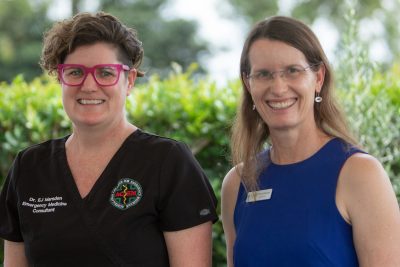RADAR RR grant to provide hospital level care at home
As the Australian population ages, the number of Emergency Department (ED) presentations by frail older persons from residential aged care facilities (RACFs) is increasing.

Caboolture Hospital Clinical Director Dr Elizabeth Marsden with Redcliffe Hospital Medical Director and EMF Board Director, Dr Kim Hansen (photo courtesy of EMF).
However, busy EDs can struggle to manage this complex vulnerable cohort, often exposing them to unnecessary investigations, prolonged length of stays, and complications such as delirium. Alternative models of care focusing on ED and admission avoidance continue to be developed, both nationally and internationally.
The Residential Aged Care District Assessment and Referral Rapid Response (RADAR RR) is a successful model developed by Metro North Health. It provides Emergency Department equivalent acute care in the resident’s home.
This is achieved by in-home assessment and treatment initiated by nurse practitioners with enhanced scope of practice including analgesia, pathology, ultrasound, imaging such as wrist x-rays, suturing and plastering — all interventions usually requiring transfer to an ED.
Nurse practitioners also assist with patient and carer-centred goals of treatment, cognitive screening, and appropriate disposition planning including nurse-led referral directly to the geriatric inpatient team or alternative community care pathways such as Hospital in the Home and end-of-life discussions.
RADAR RR was successfully implemented during the pandemic and quality improvement data has consistently indicated the model’s ability to provide an equivalent ED service in RACFs.
However, a comprehensive research evaluation of the RADAR RR model of care is critical to ensure positive, safe outcomes and provide information for potential model implementation at scale across Queensland.
Supported by an Emergency Management Foundation (EMF) grant in 2018, Caboolture Hospital Clinical Director Dr Elizabeth Marsden evaluated the implementation of the initial Geriatric Emergency Department Intervention model of service delivery.
Dr Marsden recently secured a further $80,000 grant from EMF to evaluate the clinical and cost outcomes of RADAR RR model to determine if it provides the equivalent to the care provided by a traditional ED.
“The team and I will also review the structures and processes required for effective service delivery which will, in turn, guide the development of a toolkit to assist other hospitals in adopting the RADAR RR model if appropriate for their area,” Dr Marsden said.
“Given increasing pressure for high value models of care, we will undertake an economic evaluation to determine if the RADAR RR model is more economically efficient than the traditional ED model of care.”
RADAR RR has grown into an advanced, innovative model that could be applicable and translatable to a wide range of hospital sites.
“By providing a right place, right time model of care, it could assist hospitals to utilise alternative care pathways keeping care closer to home,” Dr Marsden said.
“We anticipate the evidence from this project will enable us to create toolkits and guidelines that other state and national health services could utilise for implementation of this new model of emergency care.
“Through increased awareness and improved understanding of the impact of this innovative, patient and carer-centred model of care, health services will be better informed when considering the benefits and feasibility of scale and spread of the RADAR RR model of care.”
